Donghu Kim
Hyperspherical Normalization for Scalable Deep Reinforcement Learning
Feb 21, 2025Abstract:Scaling up the model size and computation has brought consistent performance improvements in supervised learning. However, this lesson often fails to apply to reinforcement learning (RL) because training the model on non-stationary data easily leads to overfitting and unstable optimization. In response, we introduce SimbaV2, a novel RL architecture designed to stabilize optimization by (i) constraining the growth of weight and feature norm by hyperspherical normalization; and (ii) using a distributional value estimation with reward scaling to maintain stable gradients under varying reward magnitudes. Using the soft actor-critic as a base algorithm, SimbaV2 scales up effectively with larger models and greater compute, achieving state-of-the-art performance on 57 continuous control tasks across 4 domains. The code is available at https://dojeon-ai.github.io/SimbaV2.
SimBa: Simplicity Bias for Scaling Up Parameters in Deep Reinforcement Learning
Oct 13, 2024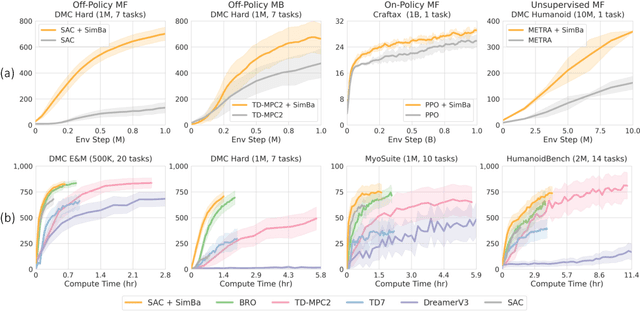

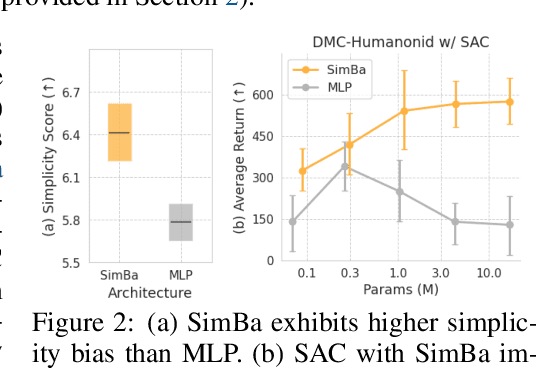
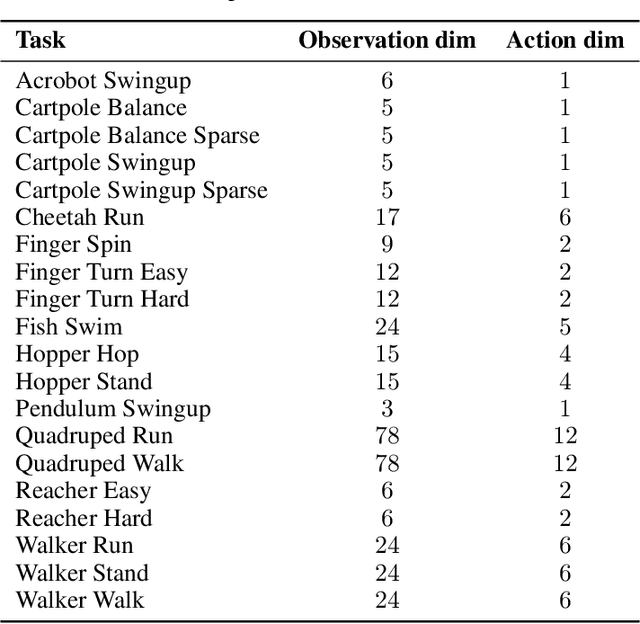
Abstract:Recent advances in CV and NLP have been largely driven by scaling up the number of network parameters, despite traditional theories suggesting that larger networks are prone to overfitting. These large networks avoid overfitting by integrating components that induce a simplicity bias, guiding models toward simple and generalizable solutions. However, in deep RL, designing and scaling up networks have been less explored. Motivated by this opportunity, we present SimBa, an architecture designed to scale up parameters in deep RL by injecting a simplicity bias. SimBa consists of three components: (i) an observation normalization layer that standardizes inputs with running statistics, (ii) a residual feedforward block to provide a linear pathway from the input to output, and (iii) a layer normalization to control feature magnitudes. By scaling up parameters with SimBa, the sample efficiency of various deep RL algorithms-including off-policy, on-policy, and unsupervised methods-is consistently improved. Moreover, solely by integrating SimBa architecture into SAC, it matches or surpasses state-of-the-art deep RL methods with high computational efficiency across DMC, MyoSuite, and HumanoidBench. These results demonstrate SimBa's broad applicability and effectiveness across diverse RL algorithms and environments.
Investigating Pre-Training Objectives for Generalization in Vision-Based Reinforcement Learning
Jun 10, 2024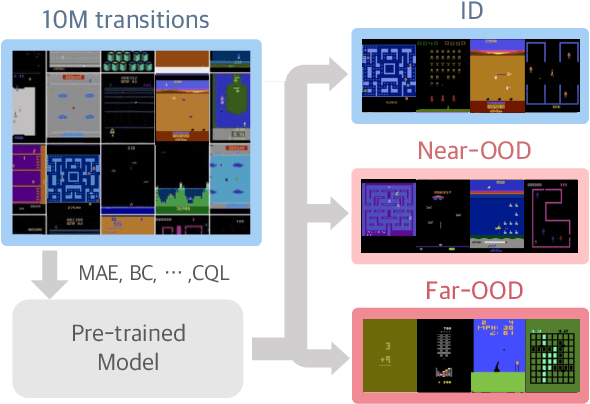



Abstract:Recently, various pre-training methods have been introduced in vision-based Reinforcement Learning (RL). However, their generalization ability remains unclear due to evaluations being limited to in-distribution environments and non-unified experimental setups. To address this, we introduce the Atari Pre-training Benchmark (Atari-PB), which pre-trains a ResNet-50 model on 10 million transitions from 50 Atari games and evaluates it across diverse environment distributions. Our experiments show that pre-training objectives focused on learning task-agnostic features (e.g., identifying objects and understanding temporal dynamics) enhance generalization across different environments. In contrast, objectives focused on learning task-specific knowledge (e.g., identifying agents and fitting reward functions) improve performance in environments similar to the pre-training dataset but not in varied ones. We publicize our codes, datasets, and model checkpoints at https://github.com/dojeon-ai/Atari-PB.
Do's and Don'ts: Learning Desirable Skills with Instruction Videos
Jun 01, 2024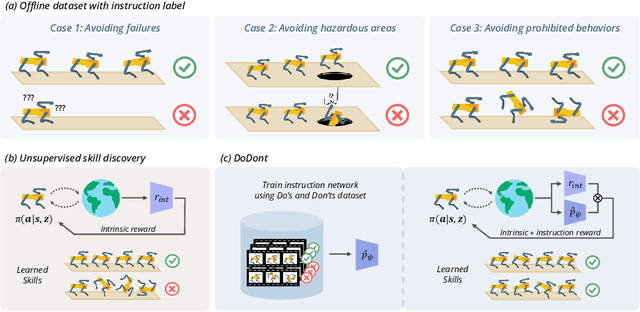



Abstract:Unsupervised skill discovery is a learning paradigm that aims to acquire diverse behaviors without explicit rewards. However, it faces challenges in learning complex behaviors and often leads to learning unsafe or undesirable behaviors. For instance, in various continuous control tasks, current unsupervised skill discovery methods succeed in learning basic locomotions like standing but struggle with learning more complex movements such as walking and running. Moreover, they may acquire unsafe behaviors like tripping and rolling or navigate to undesirable locations such as pitfalls or hazardous areas. In response, we present DoDont (Do's and Don'ts), an instruction-based skill discovery algorithm composed of two stages. First, in an instruction learning stage, DoDont leverages action-free instruction videos to train an instruction network to distinguish desirable transitions from undesirable ones. Then, in the skill learning stage, the instruction network adjusts the reward function of the skill discovery algorithm to weight the desired behaviors. Specifically, we integrate the instruction network into a distance-maximizing skill discovery algorithm, where the instruction network serves as the distance function. Empirically, with less than 8 instruction videos, DoDont effectively learns desirable behaviors and avoids undesirable ones across complex continuous control tasks. Code and videos are available at https://mynsng.github.io/dodont/
Slow and Steady Wins the Race: Maintaining Plasticity with Hare and Tortoise Networks
Jun 01, 2024Abstract:This study investigates the loss of generalization ability in neural networks, revisiting warm-starting experiments from Ash & Adams. Our empirical analysis reveals that common methods designed to enhance plasticity by maintaining trainability provide limited benefits to generalization. While reinitializing the network can be effective, it also risks losing valuable prior knowledge. To this end, we introduce the Hare & Tortoise, inspired by the brain's complementary learning system. Hare & Tortoise consists of two components: the Hare network, which rapidly adapts to new information analogously to the hippocampus, and the Tortoise network, which gradually integrates knowledge akin to the neocortex. By periodically reinitializing the Hare network to the Tortoise's weights, our method preserves plasticity while retaining general knowledge. Hare & Tortoise can effectively maintain the network's ability to generalize, which improves advanced reinforcement learning algorithms on the Atari-100k benchmark. The code is available at https://github.com/dojeon-ai/hare-tortoise.
 Add to Chrome
Add to Chrome Add to Firefox
Add to Firefox Add to Edge
Add to Edge